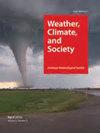What Floodplain Managers Want: Using Weather and Climate Information for Decision-Making
IF 1.9
4区 地球科学
Q3 ENVIRONMENTAL STUDIES
引用次数: 0
Abstract
Due to climate change, extreme precipitation events are likely to become more common in Oklahoma, requiring cities and municipalities to plan for managing this extra water. There are multiple types of practitioners within communities who are responsible for overseeing planning for the future, including stormwater and floodplain management. These practitioners may be able to integrate weather and climate information into their decision-making to help them prepare for heavy precipitation events and their impacts. Floodplain managers from central and eastern Oklahoma were interviewed to learn what information they currently use and how it informs their decision-making. When making decisions in the short-term, floodplain managers relied on weather forecasts, and for long-term decisions, other factors such as constrained budgets or the power of county officials had more influence than specific climate predictions or projections. On all timescales, social networks and prior experience with flooding informed floodplain manager’s decisions and planning. Overall, weather and climate information are just one component of floodplain managers’ decision-making process. The atmospheric science community could work more collaboratively with practitioners so that weather and climate information is more useful and therefore more relevant to the types of decisions that floodplain managers make.河漫滩管理者想要什么:使用天气和气候信息进行决策
由于气候变化,极端降水事件在俄克拉何马州可能会变得更加常见,这需要城市和市政当局制定计划来管理这些额外的水。社区中有多种类型的从业者负责监督未来的规划,包括雨水和洪泛平原的管理。这些从业者可能能够将天气和气候信息整合到他们的决策中,以帮助他们为强降水事件及其影响做好准备。来自俄克拉荷马州中部和东部的洪泛区管理者接受了采访,以了解他们目前使用的信息以及这些信息如何影响他们的决策。在做短期决策时,洪泛区管理者依赖天气预报,而在做长期决策时,其他因素,如预算有限或县官员的权力,比具体的气候预测或预测更有影响力。在所有的时间尺度上,社会网络和先前的洪水经验为洪泛区管理者的决策和规划提供了信息。总的来说,天气和气候信息只是河漫滩管理者决策过程的一个组成部分。大气科学界可以与从业者进行更多的合作,使天气和气候信息更有用,从而与洪泛区管理者做出的各种决策更相关。
本文章由计算机程序翻译,如有差异,请以英文原文为准。
求助全文
约1分钟内获得全文
求助全文
来源期刊

Weather Climate and Society
METEOROLOGY & ATMOSPHERIC SCIENCES-
CiteScore
3.40
自引率
13.60%
发文量
95
审稿时长
>12 weeks
期刊介绍:
Weather, Climate, and Society (WCAS) publishes research that encompasses economics, policy analysis, political science, history, and institutional, social, and behavioral scholarship relating to weather and climate, including climate change. Contributions must include original social science research, evidence-based analysis, and relevance to the interactions of weather and climate with society.
 求助内容:
求助内容: 应助结果提醒方式:
应助结果提醒方式:


